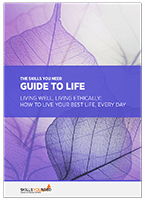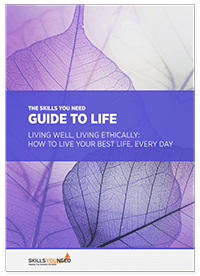Truthfulness
See also: Critical Thinking and Fake NewsSociety, especially Western society, places a high value on truth.
Truth is the foundation for a fair and just society. In court, we require witnesses to swear to tell ‘the truth, the whole truth and nothing but the truth’, because only that way can justice be delivered.
Most modern religions also have something to say on the matter, and it is clear that they place a high value on the principle of truthfulness.
But is truthfulness an outdated principle in modern times, or does it still have value?
Three things cannot be long hidden: the sun, the moon, and the truth.
- Buddha
I am the Way, the Truth, and the Life
- Jesus Christ
Two Types of Truth
There are two aspects of truthfulness: being true to yourself, and being true to others.
The two are not quite the same thing, although they are closely linked. Shakespeare, for example, suggested that someone who was true to themselves was unlikely to be false to others.
To thine own self be true, and it must follow, as night the day, that thou canst not then be false to any man.
- William Shakespeare
Truthful people will:
Understand themselves, and know their own strengths and weaknesses. They will not delude themselves about their successes or failures;
Present themselves in a way that shows who they really are. Their reputation will be founded on what they are and, whether in public or private, they will be the same;
Meet any commitments or promises that they make;
Be accurate in their descriptions of themselves or others, so that they do not mislead others.
The Importance of Truth
Truth matters, both to us as individuals and to society as a whole.
As individuals, being truthful means that we can grow and mature, learning from our mistakes.
For society, truthfulness makes social bonds, and lying and hypocrisy break them.
If you doubt this, consider what happens when you find out that someone has lied to you. You feel less inclined to trust them next time, and also less inclined to trust other people more generally.
Is it Ever Right not to Tell the Truth?
If I'd written all the truth I knew for the past ten years, about 600 people — including me — would be rotting in prison cells from Rio to Seattle today. Absolute truth is a very rare and dangerous commodity in the context of professional journalism.
Hunter S. Thompson
There are two possible ways not to tell the truth: not to provide any information, and to provide false information.
First, you do not need to tell everyone everything. Excessive sharing of personal information is not welcome, even if it is the truth. Context is all-important, and you have to consider whether people need and/or want to know.
Sometimes it is better not to say something.
You also need to be able to remain silent if someone has confided in you and asked you not to share the information further.
Under these circumstances, it is therefore appropriate not to tell all the truth.
However, is it right to provide false information or lie?
Is the ‘right’ answer to the question ‘Does my bum look big in this?’ ever ‘yes’?
Well, maybe, in the changing room, before ‘this’ is bought. But maybe not. The truthful person will think very carefully about the right answer to that question.
Truthfulness is important, but so is not hurting others. Truthfulness and tact must go hand in hand, because otherwise the truth may be unacceptable to those who hear it.
And consider a government agent. They may need to lie, or pretend to be something that they are not, for the sake of the greater good. But they may still be true to themselves if they believe in the importance of the greater good. At what point does the truth become more important?
That is a matter of personal conscience.
The truth is rarely pure and never simple.
Oscar Wilde
So there are some circumstances in which lying may be acceptable or necessary.
It is, however, never acceptable to lie in order to make yourself look better, or to avoid trouble that you have brought on yourself.
If you lie about yourself, or to avoid trouble, and people find out, they are unlikely to trust you again.
Finding the Balance
As with many other qualities, you need to find the balance in truthfulness: neither overplaying nor underplaying either your virtues or your weaknesses.
It is as bad to pretend that you are less good at something than you are, as to exaggerate about your abilities.
Teaching Children About Truthfulness
Teaching children about truthfulness is hard.
You want them to understand that it is important to tell the truth. But if they tell you that they drew on the wall, you are going to be quite cross. There is, therefore, a serious incentive to lie, and say that it was their sibling or a visitor.
You may therefore need to think about their incentives to confess, and make sure that they understand the value that you put on telling the truth. You will need to ensure that you demonstrate that, not just say it, by rewarding truth-telling in some way, even if you still need to punish the original misdeed.
Example
Jo and her children had been helping to sort the donations cupboard at the school. There were some small toys in there, which the children really liked. Jo told them to leave the toys alone because they belonged to the school.
On the way home, Jo realised that both children had taken something from the box. She asked if they had done so. Both denied it. Not wishing to give them the wrong incentive, Jo thought carefully and then said,
“If I find that you have taken something, I will be cross. But if you lie to me, and then I find that you have lied, I will be really, really cross. Did you take something?”
Both children confessed that they had done so. Jo explained that was stealing, but because they had told her the truth, she gave them a choice: they could either return the toys that they had taken, or they could replace each one with another from home. Both children opted to do that.
Further Reading from Skills You Need
The Skills You Need Guide to Life: Living Well, Living Ethically
Looking after your physical and mental health is important. It is, however, not enough. Maslow’s famous hierarchy of needs suggests that most of us need more than that. We need to know that we are living our ‘best life’: that we are doing all we can to lead a ‘good life’ that we will not regret later on.
Based on some of our most popular content, this eBook will help you to live that life. It explains about the concepts of living well and ‘goodness’, together with how to develop your own ‘moral compass’.
A Last Word
It is important to live and act in line with your values.
Being truthful to yourself matters because you cannot live in line with your values if you are pretending to yourself that you are something else.
Truthfulness allows you to be honest about yourself to yourself, and to others, and to live a life which reflects that.


